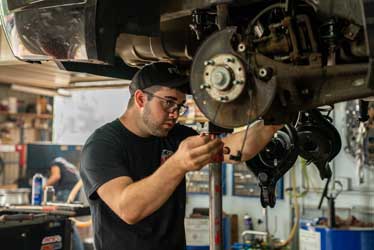Featured
Your car's brakes are among the most important elements in ensuring your safety and the security of others on the road. Regular brake evaluations are vital to preserving optimal braking performance and preventing costly repair work. Whether you're a seasoned car proprietor or a brand-new vehicle driver, comprehending brake examination guidelines can aid you remain aggressive concerning maintenance and guarantee your car is constantly roadworthy.
- Why Brake Inspections Issue. Brakes are subject to constant deterioration. The more you drive, the more rubbing your brake pads sustain, ultimately causing decreased braking effectiveness. Without correct evaluation, it's difficult to gauge when your brakes could be in need of fixing. Regular brake checks aid determine problems at an early stage, protecting against prospective failures that might put you at danger.
A properly maintained brake system ensures fast, receptive stopping power, particularly in emergency situations. It likewise helps prolong the life of your vehicle, as disregarding brake maintenance can result in much more extreme, expensive issues later on.
- Indicators You Need a Brake Examination. While it's crucial to have your brakes evaluated regularly, certain indications may suggest that they need focus. Watch (and ear) out for these caution signals:
Squealing or Grinding Sounds: Unusual noises, specifically a piercing screech or grinding noise, typically suggest that your brake pads are put on down. Vibration or Pulsation: If you feel resonances or a pulsing sensation when pressing the brake pedal, it might be a sign of distorted rotors or uneven brake pad wear. Lowered Brake Responsiveness: If your brakes feel much less responsive or you have to push the pedal harder to reduce down, it may suggest air in the brake lines or reduced brake fluid. Drawing away: If your car pulls away when braking, it might mean uneven brake pad wear or a brake liquid leak. Control Panel Caution Lights: Some cars and trucks have brake-related caution lights that show problems like low brake fluid or used brake parts. If you notice any of these symptoms, it's essential to have an expert mechanic carry out a brake inspection as soon as possible.

- What Takes place Throughout a Brake Assessment? Throughout a brake examination, an auto mechanic will certainly inspect several crucial components of the stopping system to make certain everything is in working order. Right here's what you can expect throughout the procedure:
Brake Pads and Shoes: The technician will check the thickness of the brake pads or shoes. If they're too slim, they'll need to be replaced. Brake Rotors: Rotors are the discs that the brake pads press versus to slow your automobile down. They'll be looked for any type of signs of wear, racking up, or bending. Brake Fluid: Reduced or polluted brake liquid can hinder braking efficiency. The specialist will certainly examine the fluid degree and high quality and leading it up or flush it if required. Brake Lines and Hoses: Brake lines lug fluid from the master cylinder to the brakes. The auto mechanic will certainly examine for any type of leaks, cracks, or damage to guarantee proper fluid circulation. Brake Calipers and Wheel Cyndrical Tubes: Calipers and wheel cylinders push the brake pads versus the rotors or drums. The service technician will look for wear, leakages, and proper procedure. 4. Exactly how Frequently Should You Have Your Brakes Inspected? The regularity of brake assessments depends on elements like your driving behaviors, the kind of vehicle you drive, and the environment in which you drive. As a general regulation, it's a good concept to have your brakes examined every 12,000 miles or yearly. Nonetheless, if you experience any one of the indication pointed out earlier, it is necessary to obtain your brakes checked right away.
For those that regularly drive in rush hour, hilly terrain, or severe weather, more frequent examinations might be necessary.
- Significance of Timely Brake Repairs. When you find a problem with your brakes, it's important to resolve it right now. Postponing brake fixings can result in more substantial damages to your braking system, resulting in greater repair prices. In extreme cases, disregarding brake concerns can bring about finish brake failing, which is a severe safety risk.
By remaining on top of brake upkeep and resolving problems quickly, you guarantee that your brakes continue to execute as intended, keeping you and your passengers secure on the roadway.
Conclusion: Keep Your Brakes in Leading Forming. Brake inspections are a simple yet essential part of vehicle upkeep. By recognizing the significance of normal evaluations, understanding the signs of brake issues, and staying proactive with repair work, you can guarantee your automobile's braking system stays in optimal problem.
Latest Posts
Find Out Save Big on Car Maintenance with Montclare Auto Repair’s Special Deals
Explore WyHy Federal Credit Union – Essential Perks for Your Financial Success
Discover WyHy FCU – Key Advantages for Your Future
More
Latest Posts
Find Out Save Big on Car Maintenance with Montclare Auto Repair’s Special Deals
Explore WyHy Federal Credit Union – Essential Perks for Your Financial Success
Discover WyHy FCU – Key Advantages for Your Future
